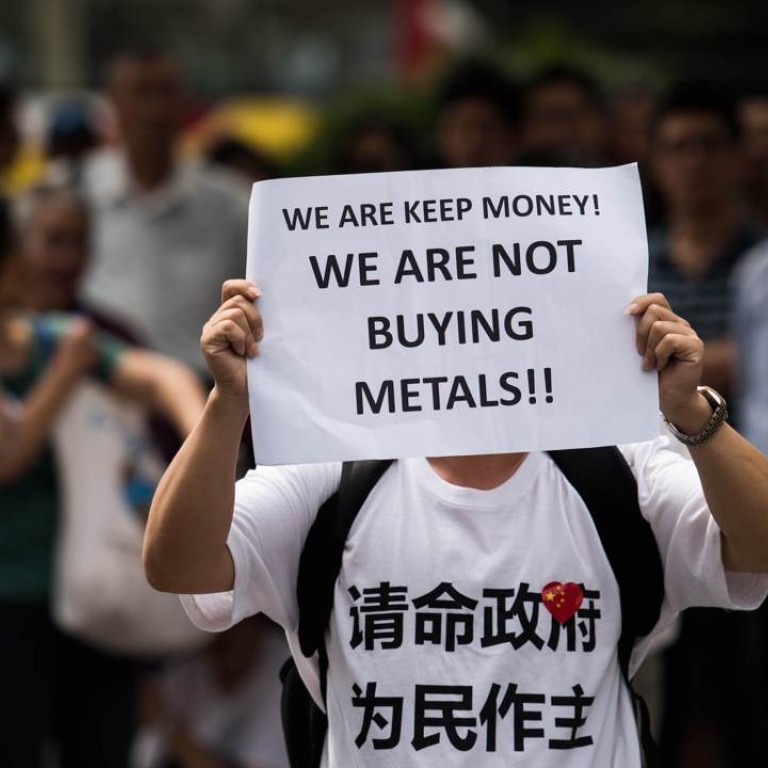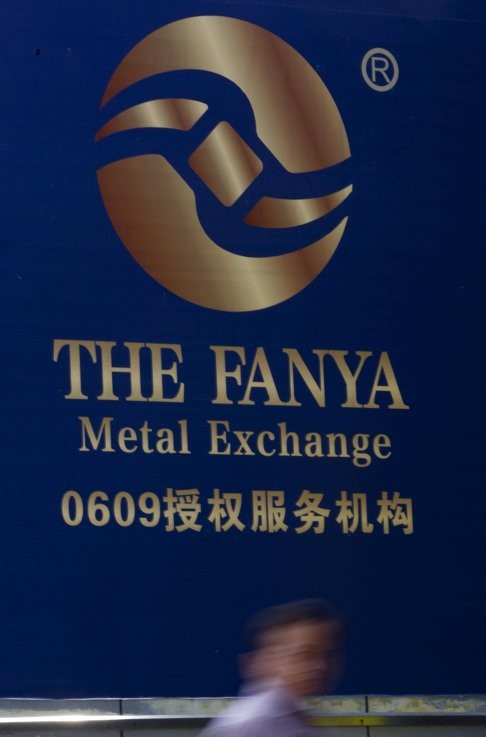
Founder of Fanya, China’s defaulting metal exchange, missing since October
Fanya defaulted on more than HK$43bn in July leaving mom-and-pop investors baying for blood
The founder of a Chinese online investment platform that defaulted on more than 36 billion yuan (HK$43.04 billion) in July, leaving thousands of retail investors out of pocket, has gone missing.
Shan Jiuliang, founder of Fanya Metals Exchange, cannot be contacted, said Imagi, a Hong Kong-listed animation studio, which is also controlled by Shan. Imagi made the revelation in a stock exchange filing.
“Shan last attended a board meeting on 15 October 2015, and he has not attended any subsequent board meetings,” the filing said.
Zhang Peng, Shan’s wife, also an executive director of Imagi, had requested the company to reschedule the most recent board meeting for Shan to December 11 from November 27, but none of them showed up.
READ MORE: Chinese investors attack bestselling financial author they blame for ‘40 billion yuan losses’
Shan holds a 23.74 per cent stake in Imagi while his wife Zhang holds 23.74 per cent. They are the biggest shareholders, according to the company’s interim report.
Two sources with knowledge of the matter said Shan may have been detained given that the Yunnan provincial authorities were closely monitoring him since the default.
An official with the Yunnan provincial government declined to comment, but said a “work group” had been “handling Fanya matters”.
An investor with access to inside information said a manager controlling Fanya’s sales agency in Zhejiang province was taken away by police for questioning a month ago.
Mainland media Caixin reported on Thursday that the authorities were considering filing a case against Shan and Fanya based on charges of “illegally absorbing public savings”.
The latest developments have added to investors’ outrage.
READ MORE: ‘I didn’t take the money’: head of China’s Fanya Metals Exchange claims innocence in the face of 36 billion yuan debts
“If they are calling Fanya illegal, it means the government will not take over the mess or look to restructure the exchange. In that case, our money is gone. Why didn’t they take any action earlier? Why did they allow Fanya to advertise on China Central Television and party-run papers?” said a Shanghai-based investor surnamed Wang.
Shan set up Fanya in Yunnan in 2010. The platform allowed people to trade 14 rare metals and borrow money from retail investors online with a 20 per cent down payment.
But trading was suspended in July after Fanya failed to pay back investors’ principal and the 13.7 per cent annualised return it had guaranteed.
More than 80,000 investors across China have been baying for Shan’s blood since, blaming him and his sales agencies of cheating them of their money.

Song Hongbing, a best-selling financial author was attacked by angry investors on Saturday in Shanxi province for endorsing Fanya. Song later said he was forced to sign a letter of apology in which he promised to help investors recover their money.
In an interview in October, Shan told the South China Morning Post that he did not take the money from investors. It was the first and the last time he spoke to the media after Fanya’s default.
Shan had then said that the money from investors had been lent out to more than 400 financiers through Fanya. He had submitted the list of borrowers to the Kunming municipal government as well as the Yunnan provincial government. More than 90 per cent of the money had been lent to less than 100 private companies.
More and more defaults are breaking out on China’s internet-based financial platforms, a sector that has thrived in recent years in the absence of regulation.
On Wednesday, Chinese police said they had taken “coercive measures” against suspects at Ezubao, the country’s largest online peer-to-peer (P2P) platform by lending figures.
Ezubao had lent out 70 billion yuan and counts Bank of China, the country’s fourth-biggest lender, as its major creditor, Caixin reported.

